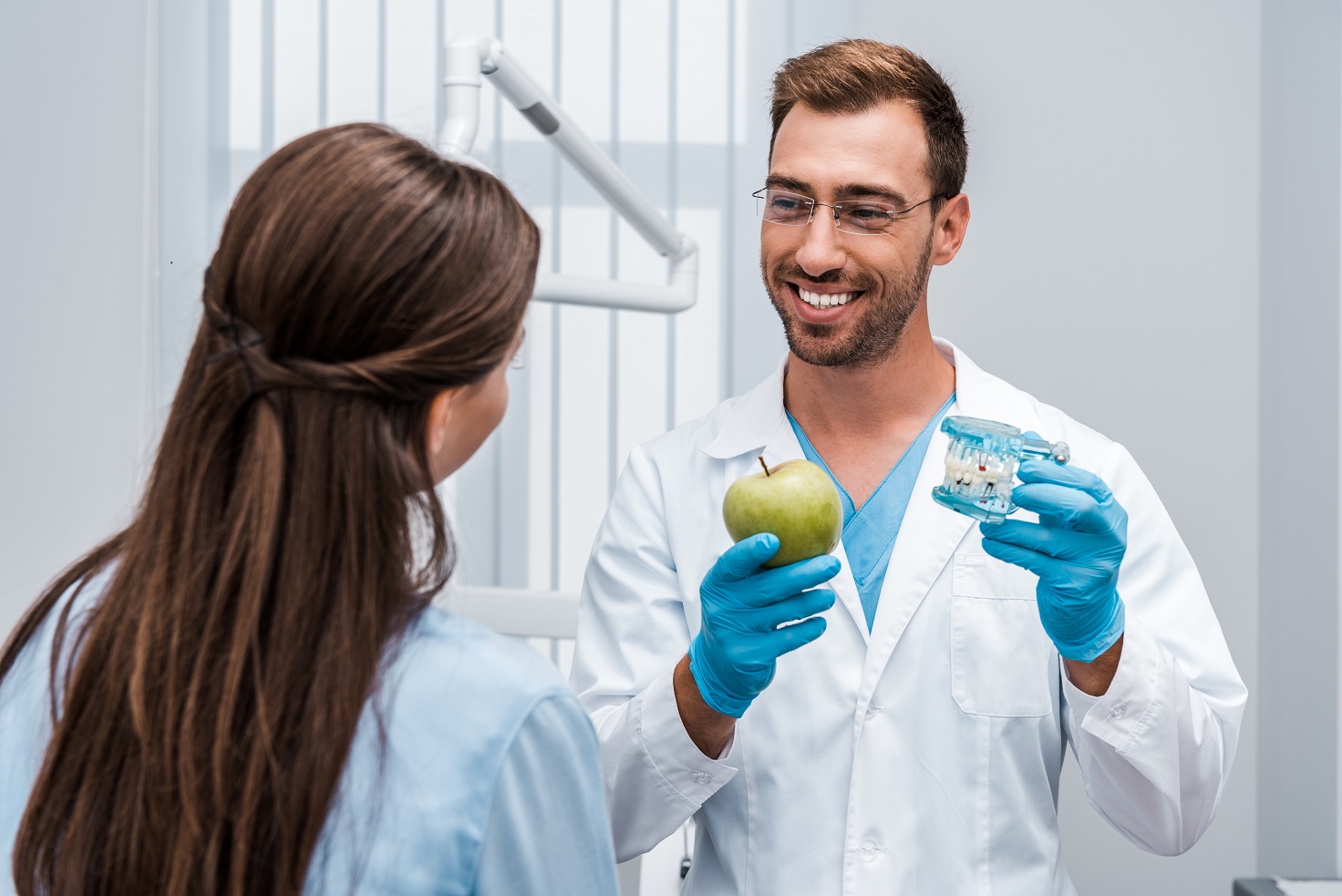
Maintaining strong teeth and healthy gums goes beyond brushing and flossing—what you eat matters just as much. While oral hygiene habits help remove plaque and reduce bacteria, your daily snack choices can either support or undermine your dental health. Some snacks feed the bacteria that cause decay, while others help protect enamel, stimulate saliva production, and provide key nutrients for your teeth.
In this blog, we’ll explore dentist-approved snack options that are not only good for your body but also for your smile. Whether you’re looking for healthy ideas for your child’s lunchbox or your own midday pick-me-up, these tooth-friendly options are a great place to start.
Why Snack Choices Affect Dental Health?
Frequent snacking—especially on sugary or starchy foods—can expose your teeth to repeated acid attacks. Every time you eat, the bacteria in your mouth feed on food particles and produce acid, which can wear down enamel and lead to cavities over time.
That said, not all snacks are harmful. Some actually help your teeth by:
- Stimulating saliva flow
- Providing minerals that strengthen enamel
- Cleaning teeth surfaces naturally
- Reducing harmful bacteria in the mouth
Choosing the right snacks can help you maintain a healthier mouth between brushing and dental checkups.
Dentist-Recommended Snacks for a Healthier Smile
Cheese and Plain Yogurt
Dairy products are a great source of calcium and phosphorus, which play essential roles in maintaining strong tooth enamel. Cheese also contains casein, a protein that helps repair tooth enamel, and encourages saliva flow—your mouth’s natural defense mechanism.
Yogurt, especially plain Greek yogurt, provides calcium, protein, and probiotics that promote both dental and digestive health. Just be sure to choose sugar-free varieties to avoid feeding harmful oral bacteria.
Crunchy Vegetables
Raw veggies like carrots, cucumbers, celery, and bell peppers have a natural crunch that helps clean teeth surfaces as you chew. Their high fiber content scrubs plaque and food particles off your teeth and stimulates gums. Plus, they’re rich in vitamins A and C, which support healthy gum tissue.
Fresh Fruits (In Moderation)
Whole fruits like apples, pears, and strawberries can be good for teeth when eaten in moderation. Their high water content dilutes natural sugars and increases saliva production. Apples, in particular, have a fibrous texture that can help clean teeth. However, it’s best to rinse your mouth with water after eating fruit to minimize the effects of fruit acids and sugars.
Avoid dried fruits and fruit snacks, which tend to be sticky and high in concentrated sugars that cling to teeth.
Nuts and Seeds
Unsalted almonds, cashews, and sunflower seeds are rich in nutrients like protein, calcium, and phosphorus. These nutrients contribute to enamel health and can strengthen teeth over time. Chewing nuts also increases saliva production, which helps wash away food particles and bacteria.
Stick to raw or dry-roasted varieties and avoid those coated in sugar, salt, or flavorings that may promote decay.
Hard-Boiled Eggs
Eggs are a filling, sugar-free snack packed with protein, vitamin D, and phosphorus. Vitamin D is especially important because it helps your body absorb calcium, which contributes to strong teeth and bones. Their soft texture makes them gentle on teeth, and they’re ideal for adults and children alike.
Leafy Green Smoothies
Leafy greens like spinach, kale, and Swiss chard are loaded with calcium, folic acid, and vitamin C—all beneficial to your teeth and gums. If you’re not a fan of salads, blend them into a smoothie with unsweetened almond milk, banana, and a few berries. Avoid adding sugary juices or sweeteners to keep it dental-friendly.
Whole Grain Crackers with Hummus
Whole grain snacks offer fiber without the high sugar content of processed crackers or chips. Pairing them with hummus provides healthy fats and plant-based protein. This combination is satisfying and less likely to leave behind sticky residues that feed bacteria.
Infused Water
Plain water is the best beverage for your teeth, but adding a slice of lemon, cucumber, or mint can encourage hydration without added sugar. While citrus does contain acid, a slice in water is significantly less harmful than juice or soda. Drinking water regularly helps neutralize acids and rinse away leftover food particles.
Sugar-Free Greek Yogurt with Fresh Berries
For a refreshing snack, try plain Greek yogurt topped with a few fresh blueberries or raspberries. This offers calcium, probiotics, and antioxidants. Remember to rinse your mouth after consuming berries to prevent their natural sugars from sticking to your teeth.
Air-Popped Popcorn
Popcorn is a whole grain snack that’s high in fiber and low in sugar. It doesn’t feed the bacteria in your mouth like sticky or sugary snacks do. Just avoid buttery, salted, or caramel-coated versions, and floss afterward to remove any kernels that may get lodged between teeth.
Smart Snacking Tips for Oral Health
Making mindful choices about when and how you snack can further reduce your risk of cavities and gum issues. Here are some expert tips to help:
- Limit snacking frequency: Grazing throughout the day keeps your teeth under constant acid attack. Try to give your mouth a break between meals.
- Rinse with water: If brushing isn’t an option after snacking, swish with water to help clear food debris and acids.
- Combine snacks wisely: Pair sugary items (like fruit) with calcium-rich foods (like cheese) to help neutralize acid.
- Avoid sticky snacks: Foods like raisins, granola bars, and fruit leather cling to teeth and are harder to clean off.
- Read ingredient labels: Look for hidden sugars in “healthy” snacks such as flavored yogurt or granola.
Healthy Snacking Tips for Children
Children are particularly vulnerable to tooth decay because of frequent snacking and developing brushing habits. Encourage snacks that are both appealing and beneficial to their teeth:
- Apple slices with nut butter
- Cucumber sticks or baby carrots
- Cheese cubes or string cheese
- Whole grain toast with mashed avocado
- Plain yogurt with a drizzle of honey (for children over 1 year)
Avoid giving kids juice boxes, candies, or sticky snack packs between meals. Water and whole foods are the better choices for young smiles.
Foods to Limit or Avoid
While occasional indulgence is okay, try to minimize the following foods and snacks to protect your dental health:
- Sticky foods: Dried fruits, gummy snacks, and caramel can cling to teeth and are difficult to rinse off.
- Refined carbohydrates: Crackers, white bread, and chips can break down into sugars in the mouth.
- Sugary drinks: Juice, soda, and sweetened teas can erode enamel and feed bacteria.
- Acidic foods: Citrus fruits, vinegar-based snacks, and sodas can weaken enamel if consumed too frequently.
If you do eat these, rinse your mouth with water and avoid brushing for 30 minutes after acidic foods to prevent damaging softened enamel.
When Is the Best Time to Snack?
It’s best to enjoy snacks during or right after mealtimes. Saliva production increases during meals, helping buffer acids and clear food particles more efficiently. If you do need a snack between meals, stick to enamel-friendly options and follow them up with water.
Conclusion: Choose Smart Snacks for a Healthier Smile
Snacking can be part of a healthy lifestyle—as long as you make informed choices. By selecting foods that are low in sugar, high in fiber, and rich in enamel-supporting nutrients, you can give your teeth the best chance at staying healthy between dental visits.
Whether you’re packing lunches, curbing mid-afternoon cravings, or planning snacks for your child, let your choices reflect your commitment to oral health.
If you have concerns about your or your child’s dietary habits and how they may be affecting dental health, speak with your dentist during your next checkup. They can offer personalized recommendations that fit your lifestyle and smile goals.
Ready to Take the Next Step Toward a Healthier Smile?
At Modern Family Dentistry in Chesapeake, VA, we believe in educating our patients about all aspects of oral health—including what goes on your snack plate! Whether you’re looking for preventive care, checkups, or personalized advice, our team is here to help.
Call us today at (757) 483-4700 or visit us at 3326 Taylor Rd, Chesapeake, VA 23321 to schedule your next appointment. Let’s make your smile stronger—together!
FAQs
Are fruit juices good for dental health?
Not really. Even 100% fruit juices are high in sugar and acid. Whole fruits are a better alternative.
Is chewing gum healthy for teeth?
Yes, if it’s sugar-free. Gum stimulates saliva production, which helps clean the mouth and neutralize acids.
How often should I brush if I snack frequently?
At a minimum, twice a day. If you snack often, consider brushing or rinsing with water between meals.
Are smoothies bad for your teeth?
They can be if they contain sugary ingredients. Use leafy greens, unsweetened milk alternatives, and limit fruit to avoid excess sugars.
What snacks can help with bad breath?
Crunchy vegetables, plain yogurt, and water-rich fruits like apples can help freshen your breath.
What’s a good bedtime snack?
Low-sugar snacks like a small piece of cheese or a few almonds are ideal before bed, as they don’t contribute much to acid buildup.
